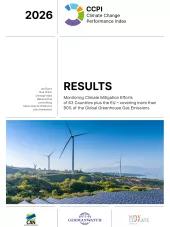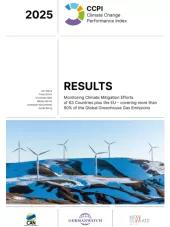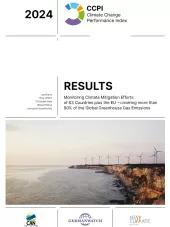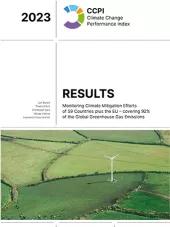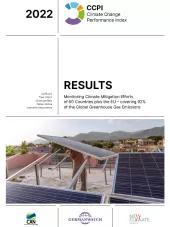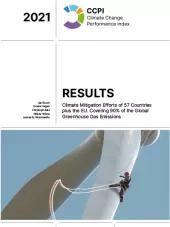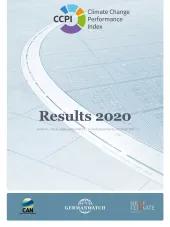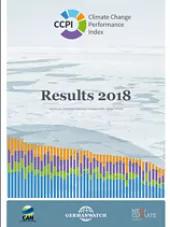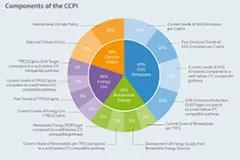Developed by NewClimate Institute, Germanwatch and CAN, the index ties in with the global Climate Change Performance Index by Germanwatch, a rating of the 58 largest emitters of GHG emissions globally that has been published annually since 2006.
Description:
Three years after the adoption of the Paris Agreement, global climate action is not yet sufficient to limit global warming to well below 2°C and to pursue efforts to limit warming to 1.5°C. In order to achieve the Paris targets, more ambitious climate action is needed. In the context of the newly released special report Global Warming of 1.5°C by the Intergovernmental Panel on Climate Change (IPCC), it is ever more urgent to act now. By showing the substantial difference in impacts between warming of 1.5°C and 2°C, the IPCC report states that limiting global warming to 1.5°C requires a rapid reduction in greenhouse gas emissions (GHG) in all sectors. Accordingly, global emissions must decrease by 45% by 2030 (as compared to 2010 levels). Global CO2 emissions need to decline by 2050.
To implement the Paris Agreement, countries must raise their ambitions and enact concrete measures to make their individual contributions to the global goal. For the past 14 years, the Climate Change Performance Index (CCPI) has tracked countries’ efforts to combat climate change. The varying initial positions, interests and strategies of the numerous countries make it difficult to distinguish their strengths and weaknesses. The CCPI has been an important tool in contributing to a clearer understanding of national and international climate policy. As we approach the year 2020, when countries need to submit their amended national climate targets (revised Nationally Determined Contributions – NDCs), the CCPI aims to inform the process of raising climate ambition.
For the CCPI 2018, we evaluated and revised the CCPI methodology to demonstrate existing measures more accurately and to encourage steps towards effective climate policy. Since last year’s edition, the CCPI is monitoring the development of all GHG emissions of the 56 countries and the EU that are assessed in the index. The index now is even better suited to measure how well countries are on track to meet the global goals of the Paris Agreement. It does this not only by comparing countries by their development and current status in the three categories “GHG Emissions”, “Renewable Energy” and “Energy Use”, but also on the Paris-compatibility of their current status and targets set for the future in each of these categories. With its globally unique policy section, the index also continues to evaluate countries' ambition and progress in the field of climate policy.
The index is published by Germanwatch, the NewClimate Institute and the Climate Action Network. It has only been possible to include a review of each country’s national and international climate policies thanks to the help of around 350 energy and climate experts from all over the world. The review charts the efforts that have been made to avoid dangerous climate change, and also evaluates the various countries’ current efforts to implement the Paris Agreement. We greatly appreciate these experts’ time, efforts and knowledge in contributing to this publication. The experts are mainly representatives of NGOs who work within their respective countries, being experts on the climate policies of their countries with a high level of independence. Best regards,
Niklas Hoehne (NewClimate Institute), Jan Burck (Germanwatch), Ursula Hagen (Germanwatch), Franziska Marten (Germanwatch), Stephan Singer (Climate Action Network International)


